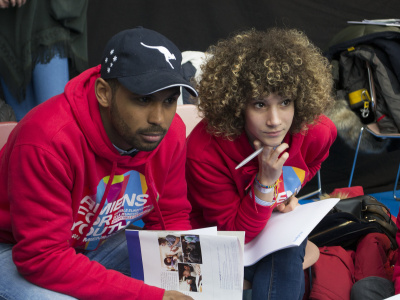
Philanthropy and Africa’s demographic growth: Finding allies to support the potential of young people
During the past decades, the significant demographic growth on the African continent has added pressure on nations’ economies. Population growth is in itself not a problem. However, it can become one when a country's economy and infrastructure do not follow suit. This blog suggests that political leaders can find allies in philanthropists – and vice versa – to open the dialogue on family planning and to drive the potential of African youth.
The high fertility rates, coupled with longer life expectancy, have created a large youth cohort in Africa, which is an added strain on national structures, as economies did not grow as fast as the population has. Hence, African youth have limited access to education and jobs, while experiencing growing frustrations with current governance and political climate in their country. As a consequence, many are making life-changing choices, such as migrating in search for opportunities and stability. How can these challenges be somehow mitigated and future opportunities opened?
The graph below provides an overview of how population structures have shifted and are still expected to shift in Africa between 1950 and 2050, according to United Nation estimates:

Values for 1950-2015 are estimates and those thereafter are medium variant projections.
This graph, in turn, shows how the shifts have progressed and are expected to change in Europe within the same timeframe:

Values for 1950-2015 are estimates and those thereafter are medium variant projections.
These graphs show very different population structures, with the African ‘pyramid’ structure in 2017 loosely resembling that of Europe in 1950, and remaining the same in 2050. It might take another 40-50 years before Africa can transition to the ‘vase’ structure of Europe’s 2017 population.
Making the most of Africa’s demographic dividend
When we speak of the demographic dividend, we refer to that phenomenon whereby as mortality rates fall and fertility steadily decreases in a country over decades, the proportion of people in the working age group is larger than the groups that depend on them. If addressed properly, this can lead to a more productive population with a higher labour supply, savings rate and greater economic growth. This new-found economic growth can be channelled towards tackling existing challenges and pressure points.
Here women have a unique role to play. Providing women with possibilities to invest more time in education or work – as opposed to family life only – is key to economic growth. Governments can play an essential role in engaging women while supporting economic growth.
Africa’s young population, estimated to reach two billion with an average age below 20 by 2050, is growing fast. By 2020, Africa is expected to have the highest fertility rate of any continent, as shown in the figure below.

Making the most of the demographic dividend, hence, calls for fertility rates to remain low among the youngest strata of the population. Along with much-needed government action on population health, education, women’s rights, economic policy and infrastructure, investing in sexual and reproductive health and rights (SRHR) is key. Effective family planning – along with education on SRHR and accessible health care services – can lower fertility rates. This would lead to women delaying the age in which they have their first child as well as to a longer period incurring between births, which both contribute to maternal and child health.
The issue of SRHR has always been a sensitive one on the African continent. Past experiences of forced family planning for women who are poor or have HIV have increased the fear to reach out to healthcare services for family planning. There is also an existing notion that encouraging the use of contraceptives is a Western-driven agenda.
Still, many African initiatives and policies have taken form and there is widespread support for SRHR based on the foundations of human rights and individual choices. This is reflected in the African Union’s theme for the year 2017, ‘Harnessing the Demographic Dividend through Investments in Youth’, as well as in other regional collaborations such as the Ouagadougou Partnership on Family Planning.
According to the prognosis in this graph, long-term effects of demographic dividend and fertility reduction policies, which are dependant on improving economic and educational circumstances, may initially result in a rise of the overall population (a rise which is proportionally higher than if no fertility reduction programme were in place).
Philanthropy: Providing the added impulse
Philanthropic funding for providing information and education in the field of sexual health can feed into existing governmental efforts to mitigate the growing pressures. Some philanthropists have taken the lead and currently contribute to global health and development by investing in family planning and HIV prevention and treatment.
For instance, Bill and Melinda Gates’ foundation has been a prominent actor at the crossroad of the demographic dividend and family planning. Aside from its funding for programmes on family planning, the foundation has been a strong voice on international platforms on issues related to the demographic dividend such as SRHR, youth and women’s empowerment. Moreover, the foundation has partnered with the John Hopkins Bloomberg School of Public health to create an institute on population and reproductive health and hosts a research platform on the demographic dividend.
Another philanthropist that has remained out of the limelight but has contributed substantially to family planning is Warren Buffet. His support for family planning is reflected in his foundation’s objectives, and he is rumoured to be behind large anonymous donations to the field of SRHR. He continues to work closely with Bill and Melinda Gates, contributing financially to their foundation with amounts adding up to more than $50 billion – half of which goes to Africa.
Although not directly touching on the demographic dividend, the conference on innovation in development that will take place in Brussels this week, where Bill Gates and the EU’s Federica Mogherini will be among the speakers, will provide an occasion for dialogue between philanthropy and political personalities. In the future, placing this topic at the centre of the debate and broadening the scope of who is invited to join these discussions, may lead to an innovative coalition on this issue.
A coalition to make the difference
Including religious and cultural leaders in the debate can be one way forward. Local realities in Africa show that, rather than the policymaker, it is often the head of the community or faith define and influence the community’s social standards and actions. Therefore, issues such as family planning, child marriage and gender-based violence cannot be seen separately from cultural norms and perspectives.
For instance, in Senegal, Islamic leaders work with the government to support family planning. Also, in Sub-Saharan African countries with high levels of HIV/AIDS, some Catholic and Protestant leaders (such as Bishop Kevin Dowling of Rustenburg), have spoken in support of contraceptive measures among unmarried youth as a lesser evil.
Lately, even Pope Francis has deviated from his predecessors by not taking a strong stance on the issue of contraceptive use, despite the 50-year Catholic Humanae Vitae agreement to discourage ‘artificial‘ contraception. The Pope’s infamous statement that ‘Catholics should not breed as rabbits’ might be also interpreted as a call for families to make more thoughtful decisions on how they want to plan their life. But the Catholic Church is still a long way from actively promoting family planning, even only in relation to birth prevention.
All in all, it is clear that philanthropy or politics alone will not suffice. It takes three to dance this tango and the role of cultural and religious leaders cannot be underestimated in this discussion. In their search for allies, philanthropists should not only exchange thoughts and combine action with political leaders, but also redirect their attention towards involving religious leaders. Looking forward, along with full agency on the continent, this balance could help to make the most of the demographic dividend, ensuring that African youth’s potential will be used to the full.
The views expressed are those of the authors and not necessarily those of ECDPM.



